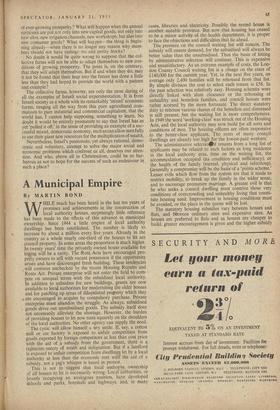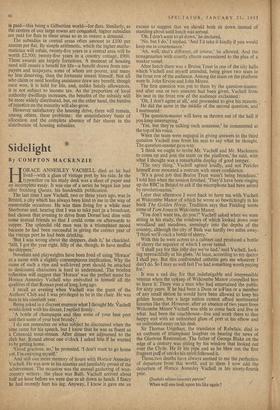A Municipal Empire
By MARTIN BOND WHILE much has been heard in the last ten years of promises and achievements in 'the construction of local authority houses, surprisingly little reference has been made to the effects of this advance in municipal ownership. Since 1944 a little empire of local authority dwellings has been established. The number is likely to i increase by about a million every five years. Already in the country as a whole nearly one-third of the houses to let arc council property. In some areas the proportion is much higher. In twenty years' time the privately owned house available for telling will be a rarity. The Rent Acts have encouraged pro- perty owners to sell with vacant possession if the opportunity arises and have discouraged fresh building. These tendencies will continue unchecked by the recent Housing Repairs and Rents Act. Private enterprise will not enter the field to com- pete on unequal terms with the subsidised local authority. In addition to subsidies for new buildings, grants are now available to local authorities for moderniSing the older houses and for patching up areas of dilapidated property which they .. ate encouraged to acquire by compulsory purchase. Private enterprise must abandon the struggle. As always, subsidised goods drive out unsubsidised goods. The subsidy itself does not necessarily alleviate the shortage. However, the burden Of providing houses to let now rests squarely on the shoulders of the local authorities. No other agency can supply the need.
' The cynic will allow himself a wry smile. If, say, a cotton mill or car factory is exposed to unfair competition from goods exported by foreign competitors at less than cost price with the aid of .a subsidy from the government, there is a righteous outcry of wrath and indignation. But if a landlord is exposed to unfair competition from dwelling let by a local authority at less than the economic rent witli the aid of a subsidy, not a pig's whisper is heard in protest. This is not to suggest that local authority ownership of all houses to let is necessarily wrong. Local authorities, or boards occupying an analogous position, have developed schools and parks, hospitals and highways, and, in many cases, libraries and electricity. Possibly the rented house is another suitable province. But now that housing has ceased to be a minor activity of the health department, it is proper to face the objections and difficulties that lie ahead.
The pressure on the council waiting list will remain. The subsidy will ensure demand, for the subsidised will always be better value than the unsubsidised. Thus the basis of letting by administrative selection will continue. This is expensive and unsatisfactory. As an extreme example of costs, the Lon- don County Council waiting list is a charge on the rates of £140,000 for the current year. Yet, in the next five years, qn average only 2,400 families will be rehoused from that list. By simple division the cost to select each tenant is £58. In the past selection was relatively easy. Housing schemes were directly linked with slum clearance or the rehousing of unhealthy and homeless families, and council houses were rather scorned by the more fortunate. The direct statutory duty to rehouse various classes of the homeless and distressed is still present, but the waiting list is more comprehensive. In 1949 the word 'working-class' was struck out of the Housing Acts, and the local authority may now build for all sorts and conditions of men. The housing officers are often responsive to the better-class applicant. The rents of many council dwellings are already too high for the lowest-paid workers. The administrative selectioOf tenants from a long list of applicants may be related' to such factors as long residence in the local authority area, time on the waiting list, the accommodation occupied (its condition and sufficiency), or the heAlth of the family (mental, physical and infectioq). penerally a compromise will be the basis' of a 'points scheme.' Lesser evils which flow from the system are that it tends to restrict mobility, to break up the family in the wider sense, and to encourage premature marriage. A greater evil is that he who seeks a council dwelling must contrive those very conditions of overcrowding and unhealthy living that consti- tute housing need. Improvement in housing conditions must be avoided, or the place in the queue will be lost.
The statutory housing subsidies vary between houses and flats, and between ordinary sites and expensive sites. As houses are preferred to flats and as houses are cheaper to build, greater encouragement is given and the higher subsidy is paid—this being a Gilbertian world—for flats. Similarly, as the centres of our large towns are congested, higher subsidies are paid for flats in these areas so as to ensure a demand.
The subsidies in central areas often amount to £100 per annum per flat. By simple arithmetic, which the higher mathe- matician will refute, twenty-five years in a central area will be worth £2,500; twenty-five years in a country cottage, £900. These awards are largely fortuitous. A moment of housing need will ensure a benefit for life—a benefit drawn from rate- payers and taxpayers, some of whom are poorer, and many no less deserving, than the fortunate tenant himself. Not all who claim or need holding assistance draw any benefit, though once won, it is held for life, and, unlike family allowances, it is not subject to income tax. As the ' proportion of local authority dwellings increases, the benefits of the subsidy will lie more widely distributed, but, on the other hand, the burden of injustice on the minority will also grow.
However satisfactory the housing drive, there will remain, among others, these problems: the unsatisfactory basis of allocation and the complete absence of fair Shares in the distribution of. housing subsidies.



































 Previous page
Previous page